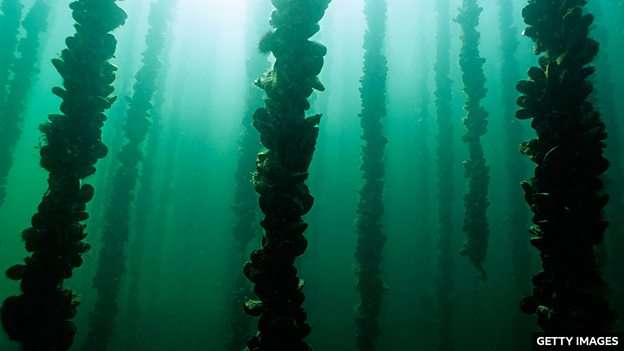英语大破解
A UK offshore mussel farm is reviving shellfish habitats 英国海上贻贝养殖场帮助重建贝类栖息地

本集内容
A UK offshore mussel farm is reviving shellfish habitats
英国海上贻贝养殖场帮助重建贝类栖息地
文字稿
Beauty below the waves.
真是一片海浪下的美景。
This is what the UK's first large-scale offshore mussel farm looks like. It's in Lyme Bay off the South Devon Coast.
这段画面展示的是英国首个大规模海上贻贝养殖场。这个养殖场位于南德文海岸附近的莱姆湾。
Ten years ago, before the farm was created, the seabed here had been completely wiped out by years of trawling and dredging.
十年前,在这个养殖场建立之前,这片海床的生态环境就已经被多年的拖网捕鱼和采砂活动破坏殆尽。
Dr Emma Sheehan, Associate Professor, University of Plymouth
"We were really surprised to see how quickly we were seeing positive changes associated with the farm. Straightaway, we were seeing mussel clumps that had fallen from the ropes, and started to create these reefs that we are now seeing. Straightaway, we started seeing cuttlefish, maybe using them to lay eggs, and… you know, it was really really quick. But now, we've been doing this for ten years, and we've seen a third increase in fish, whether they're in the water column around the ropes or on the seabed. We have seen 50% increases in the diversity of animals that live within the sediments – so they're oxygenating the sediments. And so it's just – everything we look at is just positive increases."
爱玛·希恩博士 普利茅斯大学副教授
“我们很惊讶这么快就能看到养殖场带来的积极变化。没用多久,我们就观察到了有些贻贝丛从养殖绳上脱落,并且开始形成我们今天所看到的礁体。与此同时,我们还观察到了乌贼的出现,也许它们是想利用这些礁石产卵。这些都发生得非常迅速。现在我们已经持续研究十年了,我们观察到鱼类数量增加了三分之一,这个现象不仅出现在养殖绳周围的水体中,还出现在海床附近。我们还观察到沉积物中动物种群的多样性提高了 50%——这意味着养殖场令沉积物中的含氧量上升了。所以说,我们看到的所有数据都呈现出好的势头。”
New evidence has emerged to show the mussels here are restoring historic habitats.
新发现的证据显示出这里的贻贝正在让曾经的栖息地得到恢复。
Dr Emma Sheehan, Associate Professor, University of Plymouth
"So we [suspected] that a lot of our coastline was covered in oysters and mussel reefs, but there's no evidence. And then, this map that was an absolute missing piece of information for us, for studying the farm. So now we've got this evidence that shows, not only can we say "we think that we are having a positive effect here", but we're actually restoring lost habitats. This map was from 1871 from old French fisheries data. So, it's just really exciting."
爱玛·希恩博士 普利茅斯大学副教授
“我们猜测本地的海岸线上曾覆盖着大量由牡蛎和贻贝形成的礁石,但苦于一直没有证据。然后,我们发现了这张为我们研究养殖场填补了关键信息的地图。现在我们手中的这份证据表明,我们不但可以说 ‘我们认为养殖场对这里有积极的影响’,还可以说养殖场正在让一度被破坏的生物栖息地得到恢复。这份地图来自 1871 年的法国渔业资料。所以这次发现真是太令人激动了。”
The company behind this farm harvests around 3000 tonnes of mussels a year, most of them exported to Holland.
经营这个养殖场的公司每年都能收获约三千吨贻贝,其中大多数都被出口到了荷兰。
John Holmyard, Managing Director, Offshore Shellfish
"The production of mussels in Europe has actually decreased by about 100,000 tonnes in the last 20 years, mostly because of poor water quality and a lot of other issues. But lack of space is one of them. So, the fact that we can figure out a way of growing them offshore in exposed waters, opens up a tremendous opportunity. I think the key thing we're showing is, that shellfish farming or aquaculture of the type that we do can co-exist with fishing and biodiversity, and it's pretty much a win-win-win situation for all of us."
约翰·霍姆亚德 Offshore Shellfish(海上贝类公司)总经理
“欧洲的贻贝产量已经在过去 20 年中下降了大约十万吨,主要是由于水质不良以及许多其他问题。但养殖空间不足也是问题之一。所以,我们找到一种方法从而在海上的开放水域中养殖贻贝就是创造了一个巨大的机遇。我认为这个养殖场的重要之处在于,我们证明了贝类养殖,或者说这种水产养殖方式,能够和渔业与生物多样性的保护共存。这对各行各业来说可谓是 ‘三赢’ 的局面。”
The team here is now being contacted by people from across the world, keen to try to replicate this success story.
目前,该团队收到了来自世界各地的联络,许多人都迫切地想要复制这个成功故事。